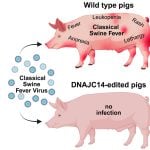IN THE LUNCHROOM IS A MAPof the world with pins that show where visitors to the farm are from. The map is covered because researchers and
dairymen from around the world flock to the barn to talk with a family of farmers known for their practical intelligence and supreme management.
Ben Loewith, his father Carl and uncle David milk 350 cows three times a day. “This family has been a major force in moving the Ontario dairy industry ahead,” says Dr. Ken Leslie from the University of Guelph. “Very few Canadian farms have had such a profound impact on the implementation of advanced production methods in the dairy industry.”
Read Also

The wildly adaptable side of next gen agriculture
Some people just fall into the world of agriculture — and consider themselves lucky to have stumbled into such a…
Dave and Carl were integral in developing the Large Herd Operators group 20 years ago and Ben is currently chair of that group (now named Progressive Dairy Operators). Over the years they’ve organized leading-edge conferences and international tours, and helped form a network for larger dairies.
In 2008, the farm won the Hamilton Chamber of Commerce’s Outstanding Business Achievement Ironman Award. The award goes to a business for its impact locally and internationally and its strength financially. What’s impressive is that in a city of half a million people, the award was won by a farm.
“The Loewiths have a real uncanny ability to focus on things that make a difference and have a good payback,” says popular dairy consultant Jack Rodenburg. “And they’re willing to share their experiences.”
Summitholme Holsteins has won this Dairy Herd Improvement award (Quebec-west) for overall herd management in five out of the last six years. Their herd’s average production was an astounding 38 kg/ cow/day in November. According to CanWest DHI, average milk production was 29 to 31 kg/cow/day in Ontario last year.
“He (Ben) is very good at picking out consistently working technology and applying that,” says Rodenburg. “The reason the Loewiths perennially win the DHI management score is that they know dairy farming is about profitability.”
For the Loewiths, the quest for improvement doesn’t stop with success. “The guys who are doing well are never happy, never satisfied,” says Ben Loewith. “1.5 kg of fat per cow per day is our high-five goal.” They were producing about 1.45 kg of fat/ cow/day in the fall.
So many different factors affect dairying that it’s impossible to have everything at maximum. Ben uses three management software programs to track the multitude of factors. “For any issue, you need to know the quantitative and the goal.”
Behind all their decisions, the Loewiths have set the objective of improving the final product, not necessarily gained efficiencies or cost savings. For example, they hire custom operators to do all their crop production so they can focus on managing the animals. “They simply do a better job than we could,” says Ben. “These guys plant corn for a living, they’re professionals in their own right.”
The three Loewiths work together — i.e. not in compartmentalized responsibilities — and they often hash out ideas during the three hours of milking. “If you’re by yourself, you can easily talk yourself into a bad decision,” says Ben.
They also have a team of advisers, including their veterinarian and feed salesman, who gather regularly and are asked who’s doing a better job in a particular area.
Numerous research projects focusing on energy balance, calf health, mastitis control and nutrition have been done on the farm with University of Guelph. This tie with academia means the Loewiths can call on leading scientists to discuss a problem they’re having and offer up the latest solutions. “The farm benefits as does the whole industry from research, and we cement relationships,” says Ben.
That exchange of information is the reason the Loewiths open up their farm and talk about anything — business, nutrition, human resources, and even succession. It’s also why Ben is currently the chair of the local branch of Dairy Farmers of Ontario, a director of the Holstein club, and on the type classification committee for Holstein Canada.
Eleven years ago David and Carl built a $2-million sand-bedded barn and new parlour. During the intensive process of building the barn, Ben decided to try a shift from office work to dairy farming for six months. They needed the extra labour and he needed a change.
To Ben’s surprise, he liked farming, particularly weighing decisions based on proven research. It’s where he wants to stay, and the family has completed a succession plan. “I love the business-side of farming and managing to improve numbers,” Ben says.
Loewith feels having a maximum $2 debt for every $1 of milk produced per year is a good ratio to help manage cash flow position. Every five years they tender out their mortgage and have timed the terms to coincide so they aren’t hit with extra fees for switching institutions.
With only a small amount of quota being traded in Ontario since last year’s quota cap, any expansion plans are frozen. Additionally, the farm is in the green belt so the Loewiths cannot get building permits to expand. Currently, the barn is producing at 125 per cent of its capacity.
The farmers who are continually expanding will either invest outside of agriculture, using the farm as a profit centre, Ben says, or they’ll buy whole, on going dairy farms and hire an on-site manager or invest in another sector or geography. “We want continued growth of revenues, but not necessarily in dairy farming.”
Although frustrated with roadblocks to expansion, Ben still supports supply management. “We could compete with the Americans (if there was no supply management) if we ran on a shoestring. We could bring in immigrant labour, use only part-time kids to milk, not pay ourselves or worry about property upkeep.
“It would be unbelievably nerve-racking to take on large expenditures without supply management,” Ben says. “I could forward contract for the year but, I couldn’t bank on it for 10 to 15 years.”
———
“ We want continued growth in revenues, but not necessarily in dairy.” — Ben Loewith
———
Loewith:an uncanny ability to focus on things that make a difference














